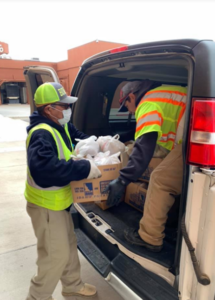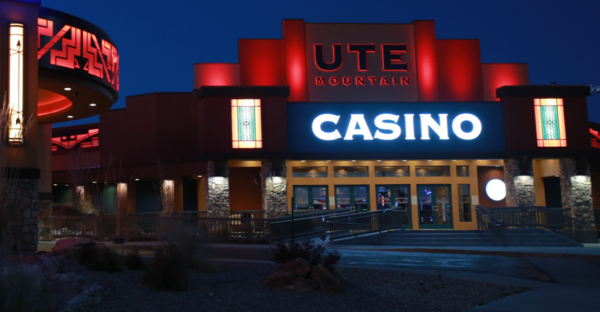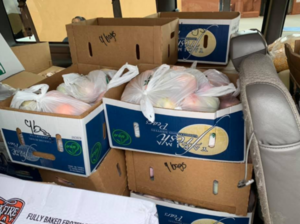
- Details
- By Levi Rickert
TOWAOC, Colo. — After the Ute Mountain Casino Hotel voluntarily closed on March 18 due to public health safety concerns over COVID-19, the casino and hotel employees did not sit idle for very long. Instead, they stepped up to lend a helping hand to ensure the Ute Mountain Tribe’s citizens received essential goods during the unprecedented situation created by the pandemic.
The Ute Mountain tribal council sought the assistance of the employees to convert the shuttered casino into a temporary warehouse that could supply the 2,500 tribal citizens in the tight-knit community in southwest Colorado, located in the Four Corners region.
The temporary warehouse has housed groceries, toiletries and other essential items to serve tribal citizens during this ongoing pandemic.
“When we began to hear the local Walmart and Kroger were out of toilet paper, we used our buying power as a casino to buy a truck load (of supplies) so that our community wouldn’t have to worry,” Ute Mountain Casino General Manager Rick Scheer said in an interview with Native News Online.
Scheer says he lived and worked through 9/11, the great recession and a union strike, but has never had the experience he has had during pandemic.
“I love that the tribal council has stepped up to protect tribal members. Everything we do is for the betterment of the tribe,” says Scheer. “We have really looked out for the elders and others in our community who are the most vulnerable.”
Since closing the casino, 650 homes on the reservation have received home deliveries of some of life’s essential items, courtesy of the casino and hotel employees.
 Ute Mountain Casino, located in southwest Colorado, is serving as a wareshouse for essential goods for Ute Mountain Tribe citizens.
Ute Mountain Casino, located in southwest Colorado, is serving as a wareshouse for essential goods for Ute Mountain Tribe citizens.
“We’re so proud of our loyal employees,” Scheer says. “Know we’re fighting an invisible enemy, our men and women come in each day with a positive attitude working for the common good.”
In addition to providing essential goods, the employees have been delivering hundreds of balanced meals to children who are out of school due to the coronavirus (COVID-19) pandemic.
The employees have been paid full benefits through April 8 to ensure their peace of mind as they continue to care for their families in a safe environment. One added perk provided by the closed casino and hotel is that employees can cash checks on site three times per week, which helps because in some cases banks are located many miles from their homes.
 Ute Mountain Casino Hotel employees have reached 650 homes on the Ute Mountain Indian Reservation essential goods.
Ute Mountain Casino Hotel employees have reached 650 homes on the Ute Mountain Indian Reservation essential goods.
While the Ute Mountain Casino Hotel has been temporarily closed, the tribe’s ExxonMobil Travel Centers remain open for business in Towaoc and White Mesa.
The Travel Centers serve as pitstops for travelers and have been determined vital resources for long-haul truck drivers along the U.S. Highways 491 and 160. The facilities offer on-site amenities such as showers, a laundry room, a trucker’s lounge, a convenience store, Wi-Fi, regular and diesel fuel and the restaurant Charlie Biggs, which is currently serving to-go orders only. To show appreciation and offer a little comfort, the Travel Centers offer complimentary coffee to all truck drivers and first responders during this time.
More Stories Like This
American Basketball Association Announces Native ABA InitiativeFour Winds South Bend Upgrades to Class III Gaming Casino
Native News Online Wins Two Awards from Native American Journalists Association
Wahlberg Brothers Are a Big Hit at Indian Gaming Tradeshow and Convention in Las Vegas
Native Gro Offers Tribes a ‘One-Stop Shop’ for Entering the Cannabis Industry
Help us defend tribal sovereignty.
At Native News Online, our mission is rooted in telling the stories that strengthen sovereignty and uplift Indigenous voices — not just at year’s end, but every single day.
Because of your generosity last year, we were able to keep our reporters on the ground in tribal communities, at national gatherings and in the halls of Congress — covering the issues that matter most to Indian Country: sovereignty, culture, education, health and economic opportunity.
That support sustained us through a tough year in 2025. Now, as we look to the year ahead, we need your help right now to ensure warrior journalism remains strong — reporting that defends tribal sovereignty, amplifies Native truth, and holds power accountable.
 The stakes couldn't be higher. Your support keeps Native voices heard, Native stories told and Native sovereignty defended.
The stakes couldn't be higher. Your support keeps Native voices heard, Native stories told and Native sovereignty defended.
Stand with Warrior Journalism today.
Levi Rickert (Potawatomi), Editor & Publisher

